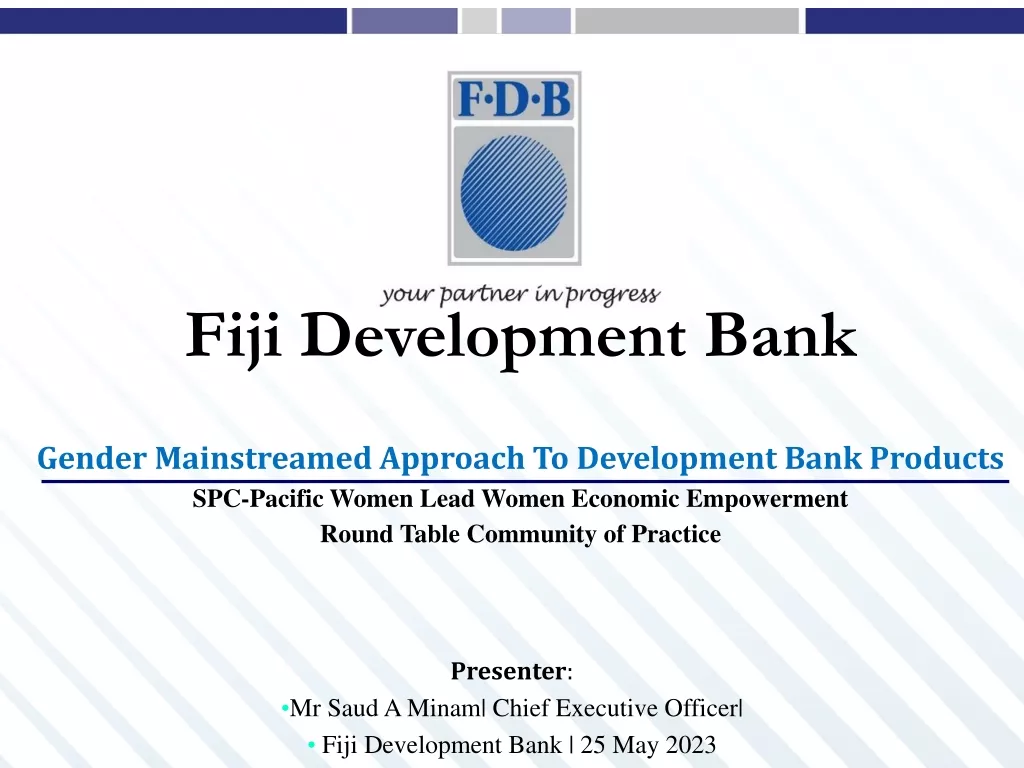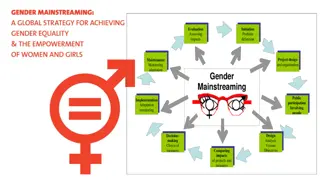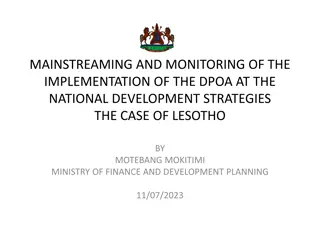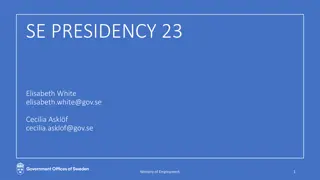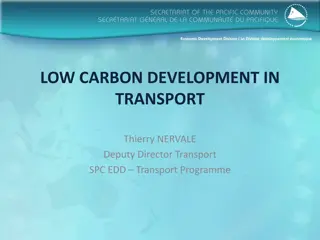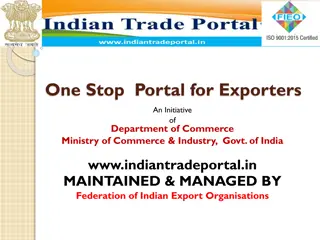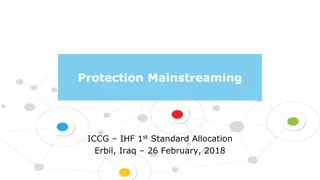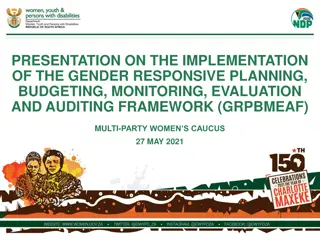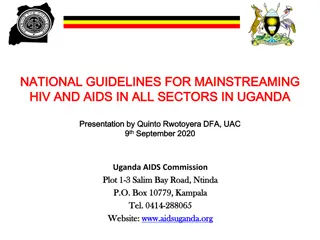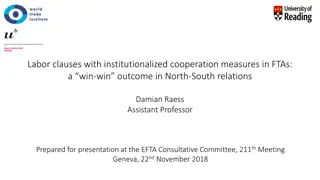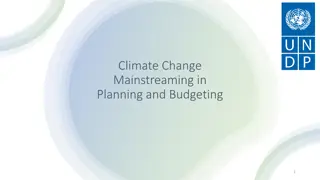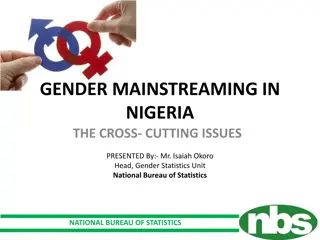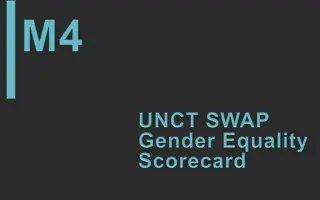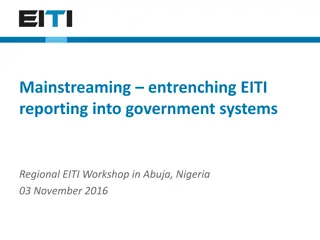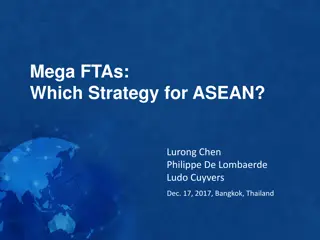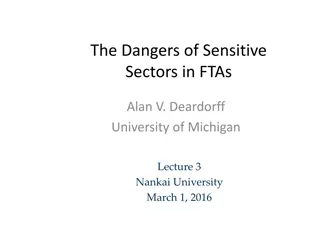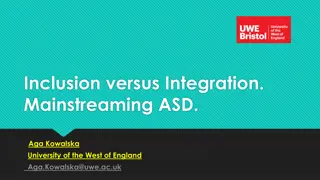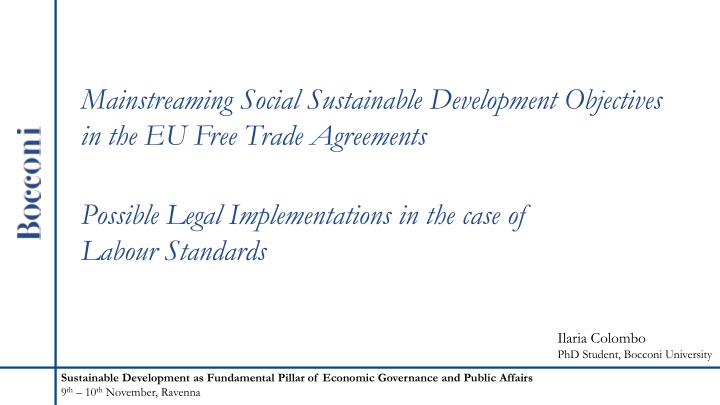
Mainstreaming Social Sustainable Development in EU FTAs
Setting the scene for mainstreaming social sustainable development objectives in EU Free Trade Agreements focusing on labor standards. Exploring the potential legal implementations and implications for sustainable development as a fundamental pillar of economic governance and public affairs.
Download Presentation

Please find below an Image/Link to download the presentation.
The content on the website is provided AS IS for your information and personal use only. It may not be sold, licensed, or shared on other websites without obtaining consent from the author. If you encounter any issues during the download, it is possible that the publisher has removed the file from their server.
You are allowed to download the files provided on this website for personal or commercial use, subject to the condition that they are used lawfully. All files are the property of their respective owners.
The content on the website is provided AS IS for your information and personal use only. It may not be sold, licensed, or shared on other websites without obtaining consent from the author.
E N D
Presentation Transcript
Mainstreaming Social Sustainable Development Objectives in the EU Free Trade Agreements Possible Legal Implementations in the case of Labour Standards Ilaria Colombo PhD Student, Bocconi University Sustainable Development as Fundamental Pillar of Economic Governance and Public Affairs 9th 10thNovember, Ravenna
SETTING THE SCENE: The New EU Action Plan as the latest EU Commission Communication Latest EU Commission Communication The power of trade partnerships: together for green and just economic growth (June 2022, COM(2022) 409 final) - The goal to pursue through the EU Trade Policy a green and just economic growth - Mainstream sustainability beyond TSDCs as a new policy priority (Policy Priority 3) But it is the latest Communication of several EU Commission Communications on EU Trade Policy (2006, 2010, 2015, 2018) a potential turning point? - Global strategy vs fragmentated approach - Promotional role vs tangible efforts to achieve sustainable development objectives - Which legal value for Sustainable Development in EU FTAs?
SETTING THE SCENE: Mainstreaming sustainability beyond TSDCs (Policy Priority 3) ENVIRONMENTAL DIMENSION SOCIAL AND ENVIRONMENTAL DIMENSION SOCIAL DIMENSION - Prioritize liberalisation of environmental goods and services, in particular of renewable energy and energy efficiency, raw materials and goods needed for the green transition (e.g., Energy and Raw materials) Encourage the use of non- discriminatory sustainability considerations in public procurement processes (Public Procurement) Chapters in the FTAs beyond TSDCs - - - Address tariff and non-tariff barriers Implementation - Promote the use of international standards in environmental protection, resource efficiency and in renewable energy Is it possible to fill this gap?
Social Sustainable Development beyond TSDCs through Labour Standards: DIGITAL TRADE CHAPTERS EU FTAs contain chapters on Digital Trade since 2008 (EU CARIFORUM FTA) but Artificial Intelligence (AI) is not addressed specifically (yet) in EU FTAs - EU-Singapore Digital Trade Agreement (ongoing negotiation), EU-New Zealand FTAs (signed July 2023), EU-Australia FTA (ongoing negotiation) silent on the matter AI replacement of human-led work activities tends to lead to job displacement effects - Right to regulate provision: add labour standards and employment concerns as legitimate policy objectives AI and tech advancements favour the gigification of work, which in turn has a detrimental effect on labour standards (e.g., freedom of association, collective bargaining) - Considering the introduction of a digital workers article in case of cross-border situations, regulating access to social protection, working conditions, obligations on platforms - Labour standards for traditional jobs vs modern jobs
Social Sustainable Development beyond TSDCs through Labour Standards: PUBLIC PROCUREMENT CHAPTERS The New Action Plan proposes to encourage the use of non-discriminatory sustainability considerations in public procurement processes - but it does not provide examples on the implementation - An emerging change of approach comparing EU-Singapore FTA and EU-Viet Nam FTA (2019) vs EU-New Zealand FTA (signed July 2023) Parties may allow procuring entities to include environmental, social and labour considerations, provided that they are non-discriminatory (art.14.2(5)(i)), EU-New Zealand FTA) - A non-mandatory provision with no reciprocity required - The non-discrimination limit: avoid disguised restrictions to trade or (unvoluntary) avoid sustainable considerations to matter? - It could be useful to further define what labour considerations are legitimate to prevent discriminatory practice, e.g: bidding companies to provide information on labour practices, compliance with labour standards, promotion of gender balance within their employees
CONCLUSION: Mainstream sustainability beyond TSDCs, work in progress A policy priority with both the potential to go unread or to represent a paradigmatic shift - How the EU and its trade partners legally implement the policy priority into the FTAs will be crucial The need for a global strategy on several levels: - The different treatment between social and environmental concerns is in contrast with the very essence of the New Action plan: environmental and social concerns to be addressed together - Mainstream sustainability will require to harmonize TSDCs with other FTAs chapters - Reconcile the promotional role of the EU FTAs with tangible efforts to protect and enhance labour standards starting from the EU FTAs The compelling need to define the legal value of Sustainable Development in ITL - The more mainstreamed it gets.. the more legal value achieves?
Thank you for your kind attention Ilaria Colombo ilaria.colombo2@phd.unibocconi.it Sustainable Development as Fundamental Pillar of Economic Governance and Public Affairs 9th 10thNovember, Ravenna

